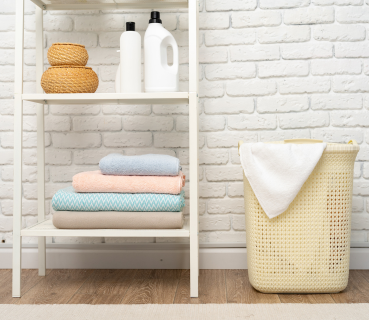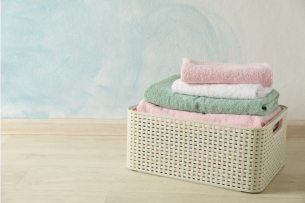
Is Dry Cleaning Better Than Washing? A Complete Comparison
We all want our clothes to last long and look their best, but the method we use to clean them plays a significant role. Dry cleaning and regular washing offer different benefits, depending on the type of fabric and clothing. Deciding which method is better is not always straightforward, so It’s better to understand the differences, advantages, and potential drawbacks of both. We will explore the ins and outs of dry cleaning and washing to help you make the best choice for your laundry.

"While dry cleaning may preserve the fabric's integrity, nothing beats the freshness of a good wash. Choose wisely based on your garments' needs."
— Dr. Ahmed Habash, CEO of Platinum Laundry
What is Dry Cleaning
Dry cleaning is a process that uses solvents instead of water to clean clothes. It’s ideal for delicate fabrics like silk & wool and special garments like suits or dresses that cannot be washed with water. The solvent used in dry cleaning helps break down dirt and oils without the risk of damaging the fabric.
Advantages of Dry Cleaning
Gentle on Delicate Fabrics:
Dry cleaning is perfect for clothes that can’t handle the roughness of regular washing. Your silks, wool coats, and suits will keep their shape and color better when dry-cleaned.
Prevents Shrinkage and Damage:
Since no water is involved, fabrics will not shrink or get misshapen. That makes dry cleaning a safer option for certain garments.
Better Stain Removal for Oil-Based Stains:
Greasy or oily stains are tough to remove with regular washing, but dry cleaning solvents can break these stains down effectively.
Disadvantages of Dry Cleaning
Higher Cost:
Dry cleaning can be expensive compared to regular washing. The solvents and professional service required come with a higher price tag.
Use of Chemical Solvents:
Most dry cleaners use chemicals like perchloroethylene, which harms the environment.
What is Regular Washing?
Regular washing is the most common method for cleaning clothes, using water and detergent to remove dirt and stains. It’s suitable for everyday fabrics like cotton, polyester, and blends that can handle the wear of water and machine washing.
Advantages of Washing
Affordable and Accessible:
Washing clothes at home is more cost-effective than taking them to the dry cleaners. You can easily throw your clothes in the washing machine, making it a convenient solution for everyday laundry.
Eco-Friendly with Water-Based Cleaning:
Water is a natural cleaning agent, and with the right detergents, washing can be relatively eco-friendly, especially when using cold water cycles.
Convenient for Daily Wear:
Regular washing is ideal for most clothing items, from t-shirts to bedsheets, and is something everyone can do at home without hassle.
Disadvantages of Washing
Can Damage Delicate Fabrics:
Washing machines can be rough on delicate items, causing shrinkage, fading, or even tearing if you are not careful.
Potential for Shrinkage or Stretching:
Some fabrics, like wool or rayon, may shrink or lose their shape after washing, especially if not handled properly.
Comparing Dry Cleaning and Washing
Fabric Care
When it comes to fabric care, the method you choose depends on the type of fabric. Dry cleaning is essential for delicate materials like silk, wool, or expensive garments that require special care. On the other hand, regular washing is great for sturdy fabrics like cotton and polyester, which can withstand machine cycles.
Stain Removal Effectiveness
Dry cleaning is best for removing oil-based stains, such as grease or makeup, while washing is better for water-based stains, like sweat or mud. If you have a silk blouse with an oil stain, dry cleaning is your best bet. For everyday stains on cotton shirts, washing works just fine.
Cost and Convenience
Dry cleaning can be pricier and less accessible than regular washing since it requires a trip to the cleaners. Washing at home is quick, easy, and costs less. Washing is the clear winner in terms of convenience for garments you wear daily, but for those special items, dry cleaning offers peace of mind.
Stain Removal Effectiveness
Comparing Dry Cleaning and Washing
Fabric Care
When it comes to fabric care, the method you choose depends on the type of fabric. Dry cleaning is essential for delicate materials like silk, wool, or expensive garments that require special care. On the other hand, regular washing is great for sturdy fabrics like cotton and polyester, which can withstand machine cycles.
Stain Removal Effectiveness
Dry cleaning is best for removing oil-based stains, such as grease or makeup, while washing is better for water-based stains, like sweat or mud. If you have a silk blouse with an oil stain, dry cleaning is your best bet. For everyday stains on cotton shirts, washing works just fine.
Cost and Convenience
Dry cleaning can be pricier and less accessible than regular washing since it requires a trip to the cleaners. Washing at home is quick, easy, and costs less. Washing is the clear winner in terms of convenience for garments you wear daily, but for those special items, dry cleaning offers peace of mind.
Recommended Cleaning Methods for Different Fabrics
| Fabric Type | Recommended Cleaning Method |
|---|---|
| Silk | Dry Cleaning |
| Wool | Dry Cleaning |
| Cotton | Regular Washing |
| Polyester | Regular Washing |
Conclusion
Both dry cleaning and washing have their own set of advantages and disadvantages, and neither method is universally better than the other. It all depends on the type of fabric you are dealing with, the stains on your clothes, and your personal preferences for convenience and cost.
This article was written by Ageance Global to provide valuable insights on fabric care.
Popular Posts

How Green Practices Can Save Your Clothes and the Planet

Is Dry Cleaning Better Than Washing? A Complete Comparison
Categories


